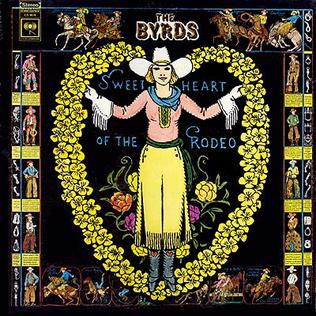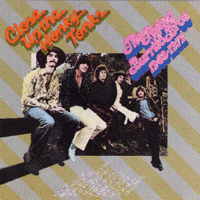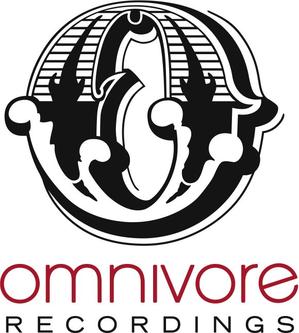
Ingram Cecil Connor III, known professionally as Gram Parsons, was an American singer, songwriter, guitarist, and pianist. He recorded as a solo artist and with the International Submarine Band, the Byrds, and the Flying Burrito Brothers, popularizing what he called "Cosmic American Music", a hybrid of country, rhythm and blues, soul, folk, and rock.
Country rock is a music genre that fuses rock and country. It was developed by rock musicians who began to record country-flavored records in the late 1960s and early 1970s. These musicians recorded rock records using country themes, vocal styles, and additional instrumentation, most characteristically pedal steel guitars. Country rock began with artists like Buffalo Springfield, Michael Nesmith, Bob Dylan, Nitty Gritty Dirt Band, the Byrds, the Flying Burrito Brothers, The International Submarine Band and others, reaching its greatest popularity in the 1970s with artists such as Emmylou Harris, the Eagles, New Riders of the Purple Sage, Linda Ronstadt, Little Feat, Poco, Charlie Daniels Band, and Pure Prairie League. Country rock also influenced artists in other genres, including The Band, the Grateful Dead, Creedence Clearwater Revival, The Rolling Stones, and George Harrison's solo work, as well as playing a part in the development of Southern rock.

The Flying Burrito Brothers are an American country rock band best known for their influential 1969 debut album, The Gilded Palace of Sin. Although the group is perhaps best known for its connection to band founders Gram Parsons and Chris Hillman, the group underwent many personnel changes and has existed in various incarnations. Now officially known as The Burrito Brothers the band continues to perform and record new albums.

Sweetheart of the Rodeo is the sixth album by American rock band the Byrds and was released in August 1968 on Columbia Records. Recorded with the addition of country rock pioneer Gram Parsons, it became the first album widely recognized as country rock as well as a seminal progressive country album, and represented a stylistic move away from the psychedelic rock of the band's previous LP, The Notorious Byrd Brothers. The Byrds had occasionally experimented with country music on their four previous albums, but Sweetheart of the Rodeo represented their fullest immersion into the genre up to that point in time. The album was responsible for bringing Parsons, who had joined the Byrds in February 1968 prior to the start of recording, to the attention of a mainstream rock audience for the first time. Thus, the album is an important chapter in Parsons' crusade to make country music fashionable for a young audience.

John LaGale Horton was an American country, honky tonk and rockabilly musician during the 1950s. He is best known for a series of history-inspired narrative country saga songs that became international hits. His 1959 single "The Battle of New Orleans" was awarded the 1960 Grammy Award for Best Country & Western Recording. The song was awarded the Grammy Hall of Fame Award and in 2001 ranked No. 333 of the Recording Industry Association of America's "Songs of the Century". His first No. 1 country song was in 1959, "When It's Springtime in Alaska ".

Safe at Home is a 1968 album by country rock group the International Submarine Band, led by the then-unknown 21-year-old Gram Parsons. The group's only album release, Safe at Home featured four of Parsons' original compositions rounded out by six covers of classic country and rock and roll songs made famous by the likes of Johnny Cash, Elvis Presley, Merle Haggard, and Hank Snow. Described as "hippie and hillbilly in equal measure", the album helped to forge the burgeoning country rock movement of the late 1960s and early 1970s.
Progressive country is a term used variously to describe a movement, radio format or subgenre of country music which developed in the late 1960s and early 1970s as a reaction against the slick, pop-oriented Nashville sound. Progressive country artists drew from Bakersfield and classic honky-tonk country and rock and roll, as well as folk, bluegrass, blues and Southern rock. Progressive country is sometimes conflated with outlaw country, which some country fans consider to be a harder-edged variant, and alternative country.
The International Submarine Band (ISB) was a country-rock band formed by Gram Parsons in 1965, while a theology student at Harvard University and John Nuese, a guitar player for local rock group, The Trolls. Nuese is credited with having persuaded Parsons to pursue the country-rock sound for which he would later be remembered. Parsons' work with the band predates his better known ventures with The Byrds, the Flying Burrito Brothers, and the Fallen Angels with Emmylou Harris.

Rockabilly Blues is an album by American country singer Johnny Cash, released on Columbia Records in 1980. Highlights include "Cold Lonesome Morning," which had some minor chart success, "Without Love," by his son-in-law, Nick Lowe, and a cover of the witty "The Twentieth Century Is Almost Over." The first two of the aforementioned songs were the only singles from the album, though "Without Love" hardly enjoyed any chart success, peaking at No. 78. "The Twentieth Century is Almost Over" was re-recorded five years later by Cash and Waylon Jennings, Willie Nelson and Kris Kristofferson, collectively known as The Highwaymen, on their first album entitled Highwayman, though it was, in essence, a duet with Nelson.

Close Up the Honky-Tonks is a compilation double-LP by country rock band The Flying Burrito Brothers, which was released in 1974. By this time, the Flying Burrito Brothers no longer existed, having been dissolved by Rick Roberts in 1973.

Flying Again is the fourth studio album by the country rock group The Flying Burrito Brothers, released in 1975.
The Bakersfield sound is a sub-genre of country music developed in the mid-to-late 1950s in and around Bakersfield, California. Bakersfield is defined by its influences of rock and roll and honky-tonk style country, and its heavy use of electric instrumentation and backbeats. It was also a reaction against the slickly produced, orchestra-laden Nashville sound, which was becoming popular in the late 1950s. The Bakersfield sound became one of the most popular and influential country genres of the 1960s, initiating a revival of honky-tonk music and influencing later country rock and outlaw country musicians, as well as progressive country.

Live 1973 is a live album by Gram Parsons and the Fallen Angels. It was recorded at Ultra Sonic Recording Studios in Hempstead, New York on March 13, 1973 during a live radio broadcast from WLIR-FM, a station located in Garden City, New York. The album was recorded in between Parsons' only two solo studio albums, GP and Grievous Angel, though it was not officially released until 1982, long after Parsons' 1973 death at age 26.

Sleepless Nights is a posthumous compilation album by Gram Parsons. Credited to Parsons and his former band The Flying Burrito Brothers, the band appear on nine of the album's twelve tracks. The album features no original songs; the majority are covers of vintage country songs; the exception is The Rolling Stones' song "Honky Tonk Women".

Hot Burritos! The Flying Burrito Brothers Anthology 1969–1972 is an album by the country rock band the Flying Burrito Brothers. It was released in 2000. A forty-three song compilation on two CDs, it includes all of their first three albums — The Gilded Palace of Sin (1969), Burrito Deluxe (1970), and The Flying Burrito Bros (1971) — along with eleven additional songs.

Ralph Eugene Mooney was an American steel guitar player and songwriter, he was inducted into the Steel Guitar Hall of Fame in 1983. He was the original steel guitarist in Merle Haggard's band, The Strangers and Waylon Jennings's band, The Waylors.
"Dim Lights, Thick Smoke " is a country song written by Joe Maphis, Rose Lee Maphis, and Max Fidler. It was originally recorded in December 1952 by the bluegrass duo Flatt & Scruggs, and later released by Joe & Rose Lee Maphis in 1953 as a single.

Omnivore Recordings is an independent record label founded in 2010. It specializes in historical releases, reissues and previously unissued vintage recordings, as well as select releases of new music, on CD, vinyl and digital formats. Omnivore Recordings is a part of Omnivore Entertainment Group LLC, which also incorporates sister companies Omnivore Music Publishing and Omnivore Creative, which provides A&R and art direction/design consulting for recording artists, artist estates, and other record labels.
"The Last Time" is a song written by Kris Kristofferson and recorded by Johnny Cash for his 1980 album Rockabilly Blues.













